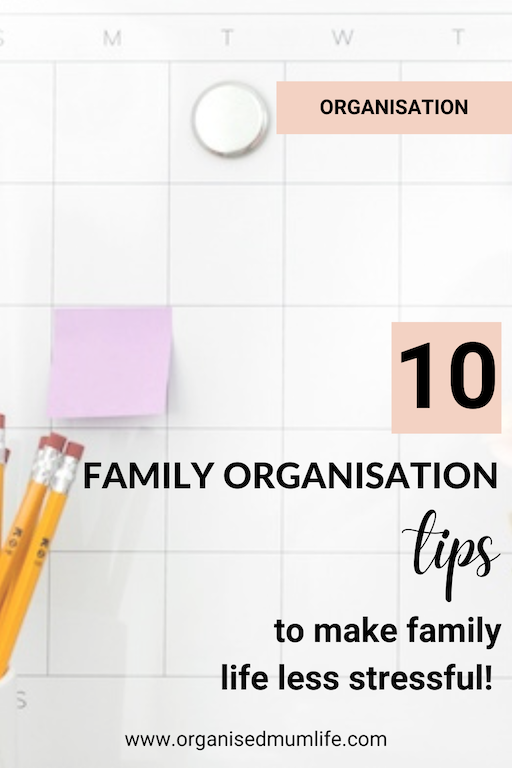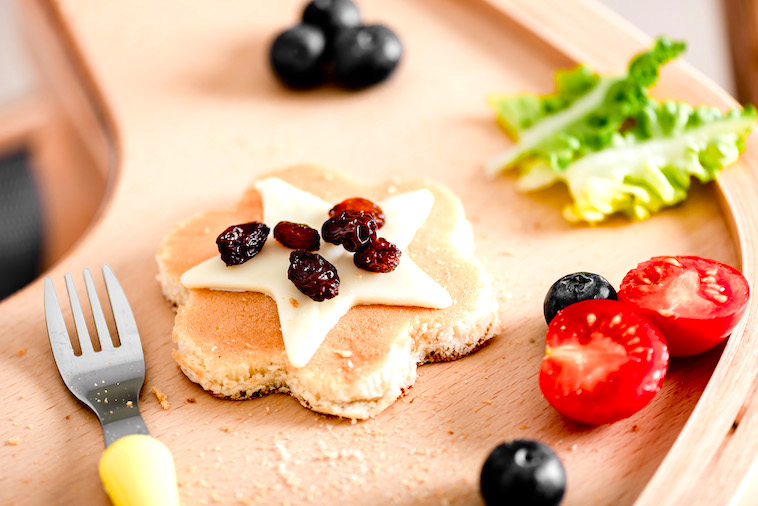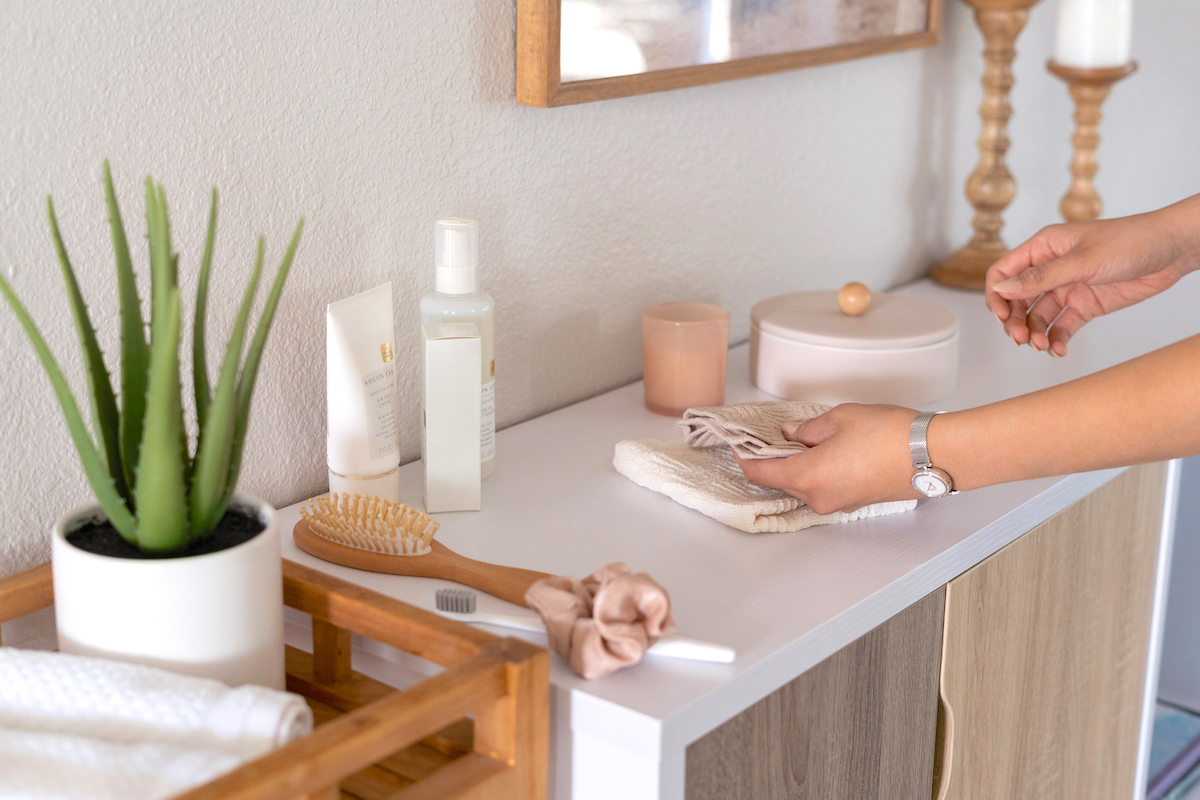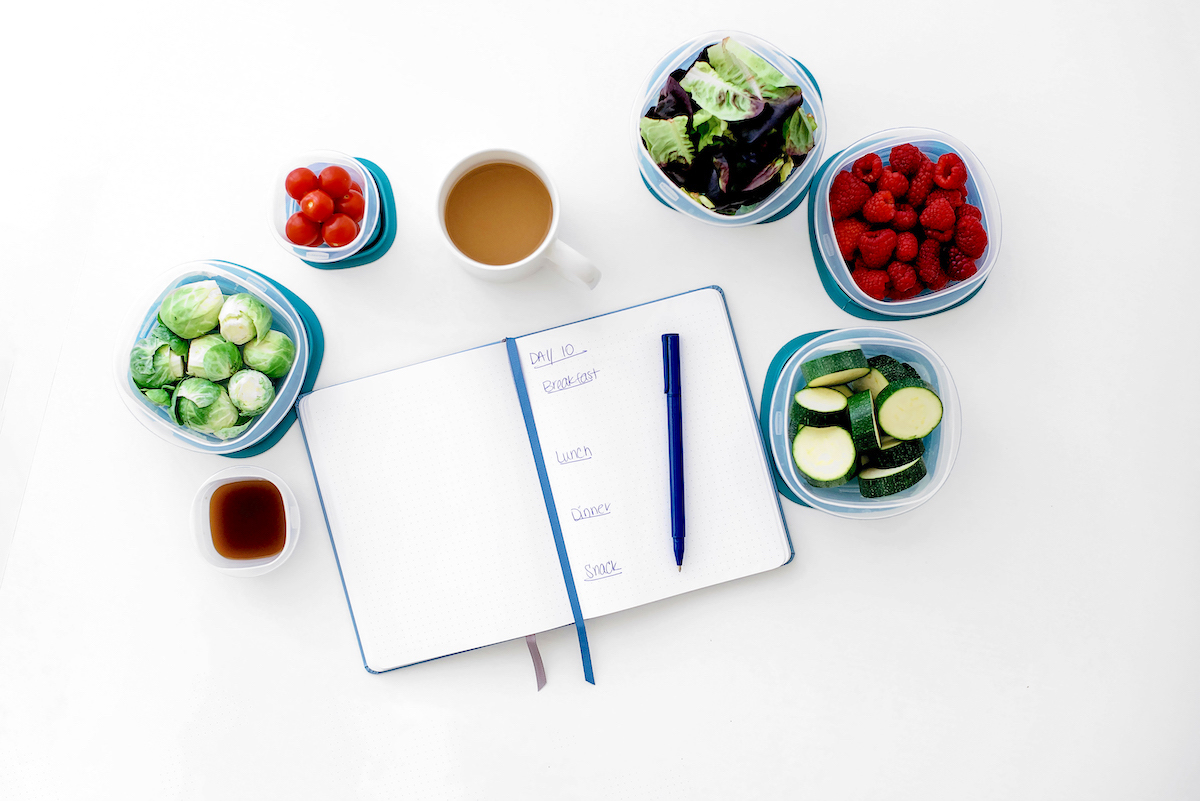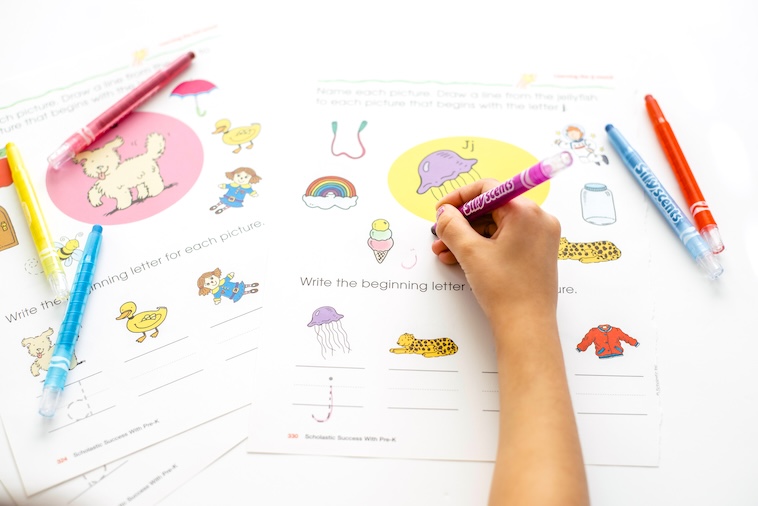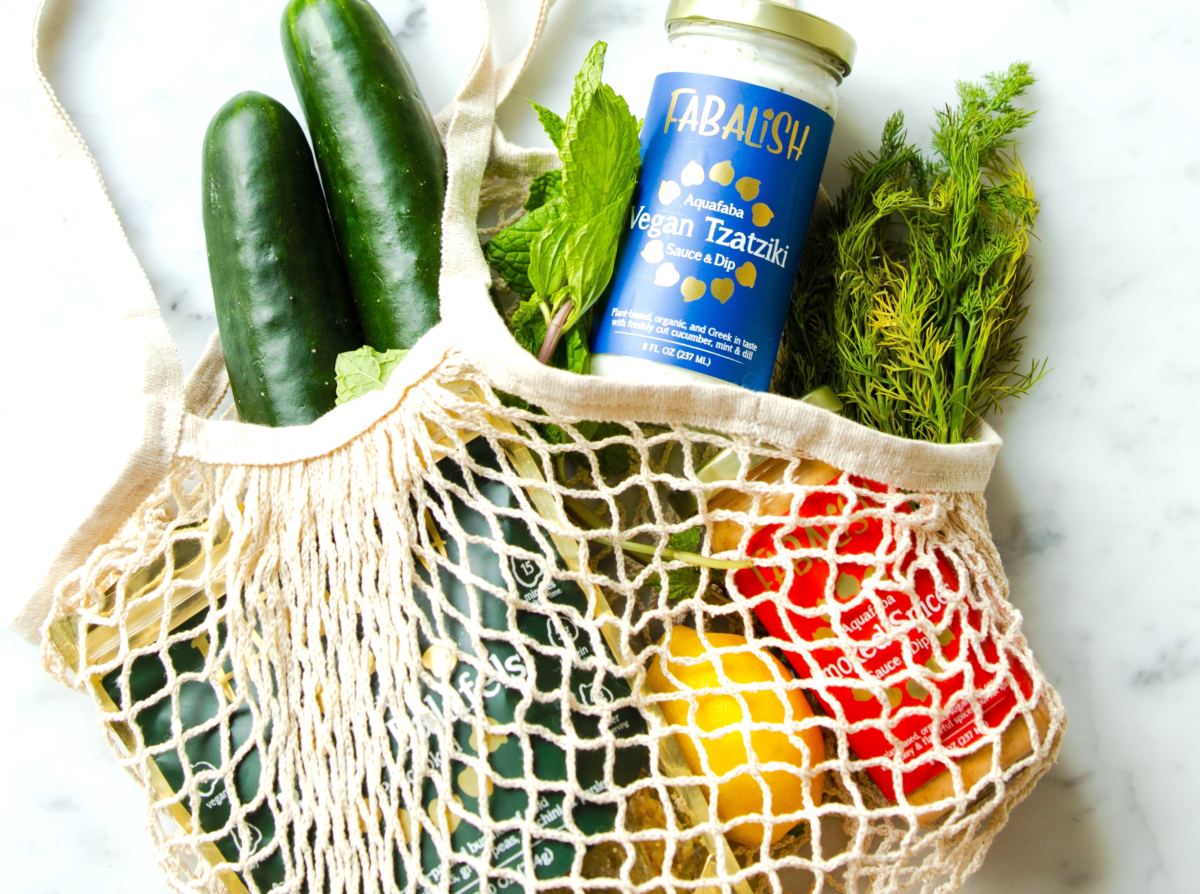10 family organisation tips to help keep things organised

As a busy mum you’re often juggling a lot at once, from household chores, school runs, and much more, the only way to keep on top of it all is to have some family organisation systems in place.
Here are some family organisation tips that will help you to remove some of the stress that comes from managing a family, many of which I use to organise my family, which have been lifesavers for me on many occasions.
Bookmark this post for future reference on Pinterest. Thank you!
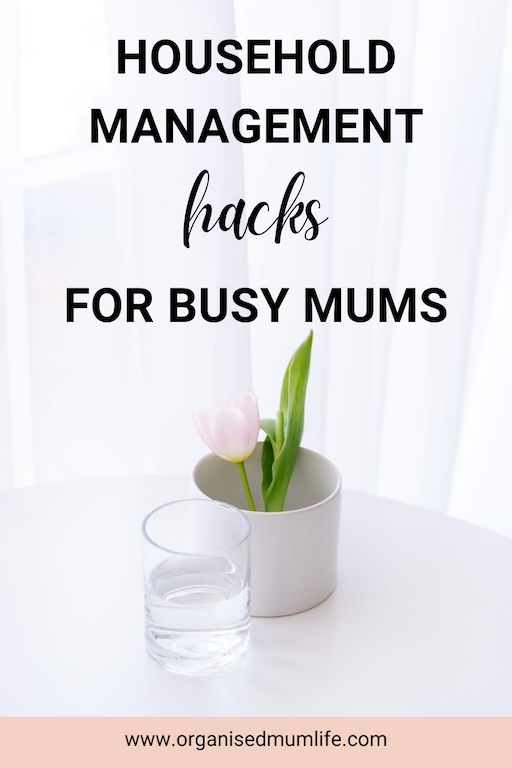
This post contains affiliate links. If you make a purchase using these links, I may receive a small commission at no extra cost to you. Find out more here.
Kid’s morning routines
Morning routines are one of the best family organisation tips that I’ve implemented in my home, without them there’s no way I’d be able to get out of the door on time.
There are many benefits of routines, one of the benefits of starting a kid’s morning routine, is that it gives you time to do what you need to do in the morning without interruptions.
Some things you can include in your kid’s morning routine are:
- Waking up the same time every day
- Setting times for things like getting dressed, and brushing teeth and hair
- Eating breakfast independently
- Packing school bags independently
Prepare the night before
One of my favourite family organisation tips is to prepare as much as you can for your morning the night before.
Some things you can do at night to help you prepare for the next day include:
- Getting everyone’s clothes ready
- Filling water bottles and making school lunches and school snacks, then packing them into an insulated school lunch bag and putting them in the fridge
- Pre preparing breakfast items like cutting fruit, making oats, or boiling eggs
Weekly meal planning
Creating a weekly meal plan is another way that I organise my family.
Two of the biggest benefits of meal planning is that you don’t have to think about what to cook every night, and you don’t have to make multiple grocery trips throughout the week.
You can start meal planning by dedicating time each week to plan your meals, write out a list of the groceries you’ll need, then schedule time to get your groceries, or have them delivered.
To take your meal planning activities one step further, you could dedicate time each weekend to meal prep or batch book, which means preparing elements of your next week’s meals in advance, such as cutting vegetables, or pre-cooking meals and freezing them until you need them.
Grocery lists
As well as being part of your weekly meal planning activities, writing a grocery list is something that you can do as food items are used.
To do this, you can have a grocery list notepad on your fridge, so whenever a family member uses the last of something, they can write it on the notepad so someone can get it next time they’re out.
Doing this means you’ll never be caught short without milk, bread, or other essential daily food items.
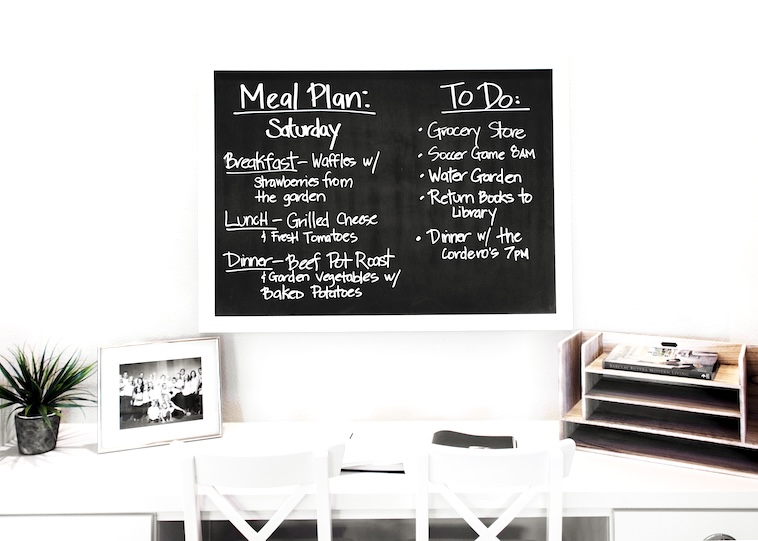
Daily cleaning habits
Creating daily cleaning habits is a great way to keep your house tidy for as long as possible.
Some of the cleaning habits that you can try to keep your house tidy, and your family organised are:
- Cleaning dishes while dinner’s cooking
- Doing speed cleans throughout the day, for example, clearing breakfast dishes and sweeping floors in the morning, putting toys away at night
- Before leaving a room remove anything that doesn’t belong there, and put it where it belongs
Age appropriate chores
Sometimes it’s hard to remember that you don’t have to do everything yourself, there are some things that you can delegate to family members, and giving your kids age appropriate chores is one way to do this.
Some chore ideas for kids include:
- Putting clothes away
- Feeding pets
- Clearing the table
- Emptying the dishwasher
- Putting groceries away
- Washing the car
Having a weekly chore chart in a location your kids can see, ensures they know what they need to do by when.
Family command centre
A family command centre is an area of your home, such as a bulletin board, wall organiser, or space on your fridge, where important things are displayed.
These important things may include:
- Weekly meal plans
- Family goals
- Family calendar
- School notices
- Grocery lists
- To do lists
A family command centre is a great family organisation tool, as it helps everyone to remember important things, and it keeps everyone informed of where family members need to be on what date.
Family calendar
One of the best ways to organise your family is by using a family calendar, which is something you may have on your family command centre, or by itself.
A family calendar can be a wall family calendar, or a digital calendar, the benefit of using one is that is allows everyone to record their appointments, events, to dos, birthdays, and anything else that allows family life to run smoothly.
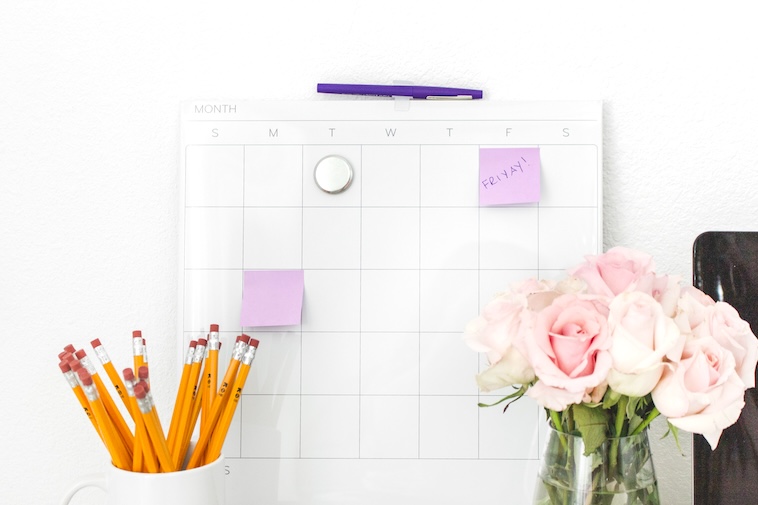
To do lists
Writing a to do list is a great way to stay organised, and prioritising your to do list ensures that your family is tackling their most important things first.
You can write a to do list in a paper planner, or you can use a digital to do list app like Todoist, Trello, or Evernote, that enable you to share lists with family members.
Decluttering
Another one of my favourite family organisation tips is to declutter fast, and often.
Setting aside time each week, or month, to declutter frequently used areas of your home like your kitchen, toy room, bathroom, or even decluttering kid’s bedrooms, helps to keep your family organised by having less items to store, clean, and maintain.
Another area to declutter is paperwork, as a lot of paperwork enters our home, especially if you have school aged children.
Making sure you action what you need to can be done by placing all of your paperwork in a desktop paperwork organiser, and then going through it every night recycling what you don’t need, filing what you’ve dealt with, and putting signed school paperwork in your kid’s school bags.
Family organisation tips – a recap
There’s a lot that goes into organising a family, but with the right tips, you can organise your family easily.
Some of these tips include:
- Starting a kid’s morning routine to help you get out the door on time
- Preparing things at night so mornings are less stressful
- Writing a weekly meal plan
- Writing a grocery list so you don’t run out of essential food items
- Creating daily cleaning habits to help keep your home tidy
- Giving your kids age appropriate chores
- Using a family command centre to display important documents
- Using a family calendar so everyone knows what’s happening
- Writing to do lists and prioritising the most important things
- Decluttering fast and often so you have less things to store, clean and maintain
What are some of your favourite family organisation tips?
Love this post? Share it with others on Pinterest – Thank you!
